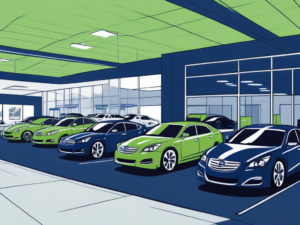Talk to Sales: (401) 200-6026

In the highly competitive automotive industry, having effective marketing strategies is crucial for driving sales and staying ahead of the competition. With the rapid advancements in technology and changing consumer behavior, it’s important for automotive brands to adapt and evolve their marketing tactics to achieve tangible results. In this article, we will explore various automotive marketing strategies that have proven to drive results for car dealerships and brands.
Understanding the Automotive Market
The automotive market is a dynamic industry that is influenced by various factors. To develop effective marketing strategies, it’s important to understand the key trends and patterns that are shaping the automotive industry.
One of the key trends in the automotive industry is the advancements in technology. With each passing year, new technologies are being introduced in cars that enhance the driving experience. From advanced safety features like collision avoidance systems to entertainment systems with touchscreen interfaces, technology is revolutionizing the automotive market.
Another trend that is shaping the automotive industry is shifting consumer preferences. In recent years, there has been a noticeable shift towards more eco-friendly and fuel-efficient vehicles. Consumers are becoming increasingly conscious of their environmental impact and are opting for electric vehicles or hybrid cars. This shift in consumer preferences has led to a surge in the production and availability of electric vehicles in the market.
Environmental concerns are also playing a significant role in shaping the automotive industry. With the growing awareness of climate change and the need to reduce greenhouse gas emissions, automotive brands are investing heavily in research and development to create more sustainable and environmentally friendly vehicles. This has led to the development of innovative technologies such as hydrogen fuel cells and biofuels.
Key Trends in the Automotive Industry
Advancements in technology, shifting consumer preferences, and environmental concerns are some of the key trends that are shaping the automotive industry. Electric vehicles, autonomous driving technology, and connectivity are some of the major trends that are driving innovation in the automotive market.
Electric vehicles (EVs) have gained significant popularity in recent years. With advancements in battery technology, EVs are now capable of offering longer driving ranges and faster charging times. As a result, more and more consumers are considering EVs as a viable alternative to traditional gasoline-powered vehicles.
Autonomous driving technology is another major trend that is revolutionizing the automotive industry. Self-driving cars are no longer a distant dream but a reality that is slowly becoming mainstream. Companies like Tesla, Google, and Uber are investing heavily in developing autonomous driving technology that promises to make driving safer and more efficient.
Connectivity is also playing a crucial role in shaping the automotive industry. With the advent of the Internet of Things (IoT), cars are becoming more connected than ever before. From in-car Wi-Fi and advanced infotainment systems to real-time traffic updates and remote vehicle monitoring, connectivity is transforming the driving experience.
Identifying Your Target Audience in the Automotive Market
Before implementing any marketing strategy, car dealerships need to identify their target audience. Understanding the demographics, psychographics, and purchase behaviors of potential customers can help automotive brands create targeted marketing campaigns that resonate with their target audience.
When identifying the target audience in the automotive market, demographic factors such as age, gender, income level, and geographic location play a crucial role. For example, luxury car brands often target affluent individuals who are willing to spend more on high-end vehicles.
Psychographics, on the other hand, focus on the psychological and social characteristics of potential customers. This includes factors such as lifestyle, values, personality traits, and interests. For instance, some consumers may prioritize safety features in a car, while others may value performance and speed.
Purchase behaviors also play an important role in identifying the target audience. Understanding how consumers make purchase decisions, whether they rely on recommendations from friends and family, online reviews, or brand reputation, can help car dealerships tailor their marketing messages accordingly.
In conclusion, the automotive market is a complex and ever-evolving industry. By understanding the key trends and patterns that shape the automotive industry and identifying the target audience, car dealerships can develop effective marketing strategies that resonate with their customers and drive business growth.
Sell cars on the lot faster with AutoRaptor
Know if we’re the right fit within 10 minutes
Traditional Automotive Marketing Strategies
While digital marketing has gained significant traction in recent years, traditional marketing strategies still hold value and can drive results for automotive brands.
In addition to digital marketing, there are several traditional strategies that automotive brands can utilize to reach a wider audience and create brand awareness. These strategies have stood the test of time and continue to be effective in the ever-evolving marketing landscape.
Television and Radio Advertising
Television and radio advertising remain powerful marketing channels for automotive brands. The visual and auditory appeal of television and radio commercials can captivate audiences and leave a lasting impression. Car dealerships can create compelling commercials that highlight the features and benefits of their vehicles, showcasing the sleek designs, advanced technologies, and exceptional performance.
By strategically running these commercials during primetime shows or popular radio programs, automotive brands can maximize their reach and target specific demographics. Whether it’s a heart-pounding sports car ad during a highly anticipated sporting event or a family-friendly SUV commercial during a popular TV series, television and radio advertising can effectively engage potential customers.
Print Advertising: Magazines and Billboards
Print advertising in automotive magazines and billboards continues to be a valuable marketing strategy. Automotive brands can showcase their vehicles in glossy car magazines, providing potential customers with an immersive experience. High-quality images, detailed specifications, and engaging content can help readers envision themselves behind the wheel of these vehicles.
Billboards, strategically placed in high-traffic areas, can also create brand awareness and capture the attention of passersby. Whether it’s a towering billboard displaying a luxurious sedan or an eye-catching digital billboard showcasing the ruggedness of an off-road vehicle, these advertisements can leave a lasting impression on potential customers.
Sponsorships and Partnerships
Collaborating with relevant events, sports teams, or influencers can significantly benefit automotive brands. Sponsorships and partnerships provide opportunities to showcase vehicles, engage with target audiences, and create memorable experiences that drive results.
By sponsoring events such as auto shows, car races, or industry conferences, automotive brands can gain exposure and reach a highly targeted audience of car enthusiasts and industry professionals. These events offer the perfect platform to display the latest models, demonstrate cutting-edge technologies, and interact with potential customers.
In addition to event sponsorships, partnering with sports teams or influencers can also be advantageous. Aligning with a successful sports team allows automotive brands to tap into the team’s loyal fan base and create brand affinity. Collaborating with influencers who have a strong online presence and a significant following can help automotive brands reach a wider audience and generate buzz around their vehicles.
While digital marketing has undoubtedly revolutionized the automotive industry, traditional marketing strategies such as television and radio advertising, print advertising in magazines and billboards, and sponsorships and partnerships continue to play a vital role in driving results for automotive brands. By integrating these traditional strategies with their digital marketing efforts, automotive brands can create a comprehensive and impactful marketing campaign that resonates with their target audience.
Sell cars on the lot faster with AutoRaptor
Know if we’re the right fit within 10 minutes
Digital Automotive Marketing Strategies
In today’s digital age, having a robust online presence is crucial for automotive brands to connect with potential customers and drive sales. With the increasing reliance on technology and the internet, car dealerships need to adapt their marketing strategies to effectively reach and engage their target audience.
One of the most powerful tools in a car dealership’s digital marketing arsenal is social media. Platforms such as Facebook, Instagram, and Twitter provide a unique opportunity for automotive brands to create meaningful connections with their target audience. By sharing engaging content, running interactive campaigns, and implementing targeted advertising, car dealerships can leverage social media to build brand loyalty and generate leads. For example, a dealership could use Facebook to showcase their latest models, share customer testimonials, and even offer exclusive deals to their followers.
Another essential component of digital automotive marketing is search engine optimization (SEO). Optimizing websites for search engines is crucial for improving organic visibility and driving website traffic. By conducting thorough keyword research, creating high-quality content, and optimizing on-page elements such as meta tags and headers, car dealerships can increase their chances of appearing in search engine results when potential customers are actively looking for vehicles. This increased visibility can lead to higher website traffic and ultimately more leads and sales for the dealership.
Email marketing is another cost-effective and powerful tool in the automotive industry. By building and segmenting email lists, car dealerships can send personalized and relevant content to their subscribers. This allows dealerships to nurture leads and stay connected with their customer base. For example, a dealership could send targeted emails to potential buyers who have shown interest in a specific model, providing them with additional information, special offers, and even personalized recommendations. This personalized approach helps to engage potential buyers at different stages of the purchase process and can significantly increase conversion rates.
In conclusion, digital automotive marketing strategies have become essential in today’s competitive landscape. Social media marketing, search engine optimization, and email marketing are just a few of the many tools available to car dealerships to effectively connect with their target audience, build brand loyalty, and drive sales. By leveraging these strategies and staying up to date with the latest digital marketing trends, automotive brands can stay ahead of the competition and thrive in the digital age.
Sell cars on the lot faster with AutoRaptor
Know if we’re the right fit within 10 minutes
Innovative Automotive Marketing Strategies
To stand out in a competitive market, automotive brands need to think outside the box and embrace innovative marketing strategies.
Virtual Reality (VR) Showrooms
Virtual reality technology can create immersive experiences for potential car buyers. By using VR showrooms, car dealerships can provide virtual tours, allow customers to customize their vehicles, and even allow test drives without leaving the comfort of their own homes. This innovative approach can enhance the customer’s journey and drive sales.
Influencer Marketing in the Automotive Industry
Partnering with influencers and bloggers who have a strong following in the automotive industry can help car dealerships increase brand exposure and credibility. By collaborating with influencers who align with their brand values, automotive brands can tap into their audience and drive engagement and conversions.
Mobile Apps for Car Dealerships
Developing a mobile app for car dealerships can enhance the customer experience and drive loyalty. Car dealerships can offer features like vehicle browsing, appointment scheduling, and even virtual assistant chatbots to provide personalized assistance. Mobile apps can be a powerful tool for customer engagement and retention.
In conclusion, automotive marketing strategies that drive results require a combination of traditional and digital approaches, as well as a willingness to embrace innovative tactics. By understanding the automotive market, identifying target audiences, and implementing effective marketing strategies, car dealerships can position themselves for success in a competitive industry.
Want to improve your sales and move cars off the lot faster? Book a test drive with AutoRaptor to see how our simple dealership CRM software can help you close more deals effectively.
Subscribe to our Newsletter
Resources to help your dealership convert more leads into sales, retain more customers, and market inventory smarter, straight to your inbox every Sunday.



